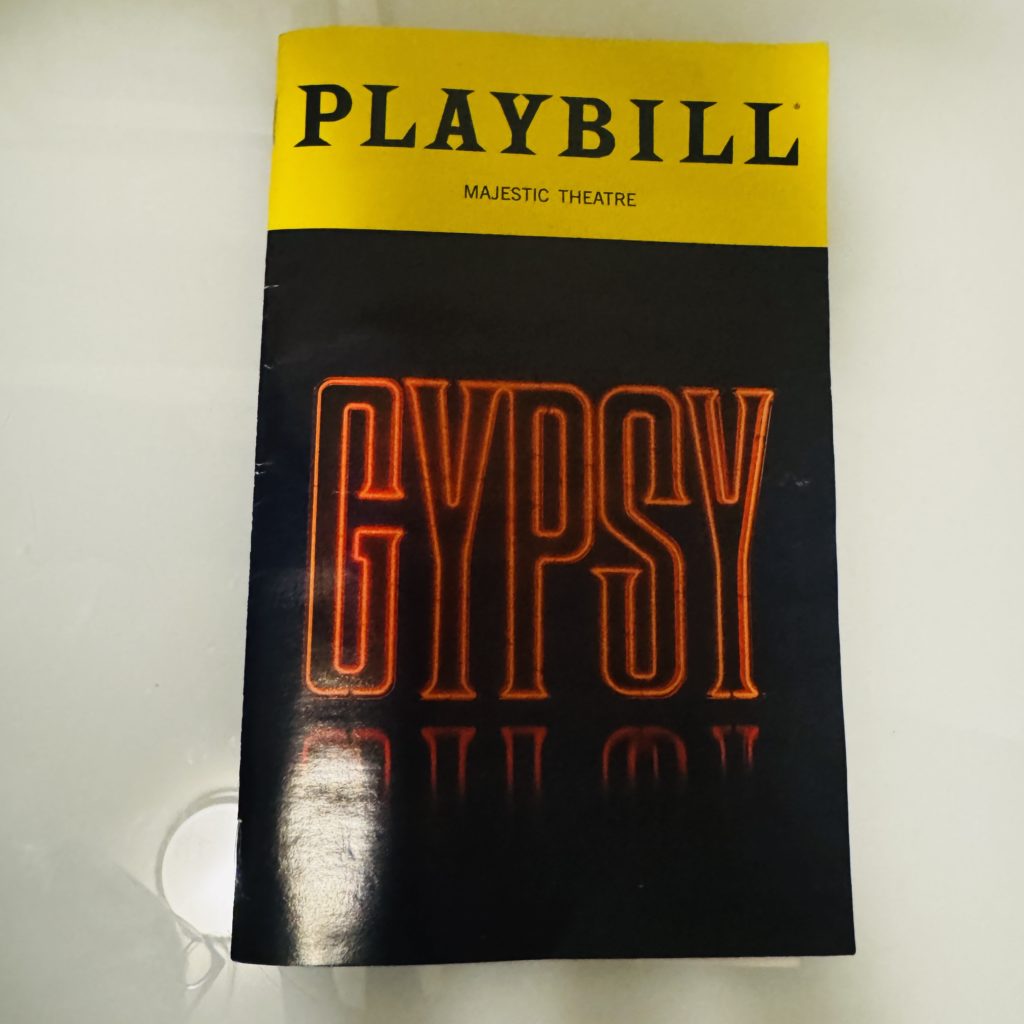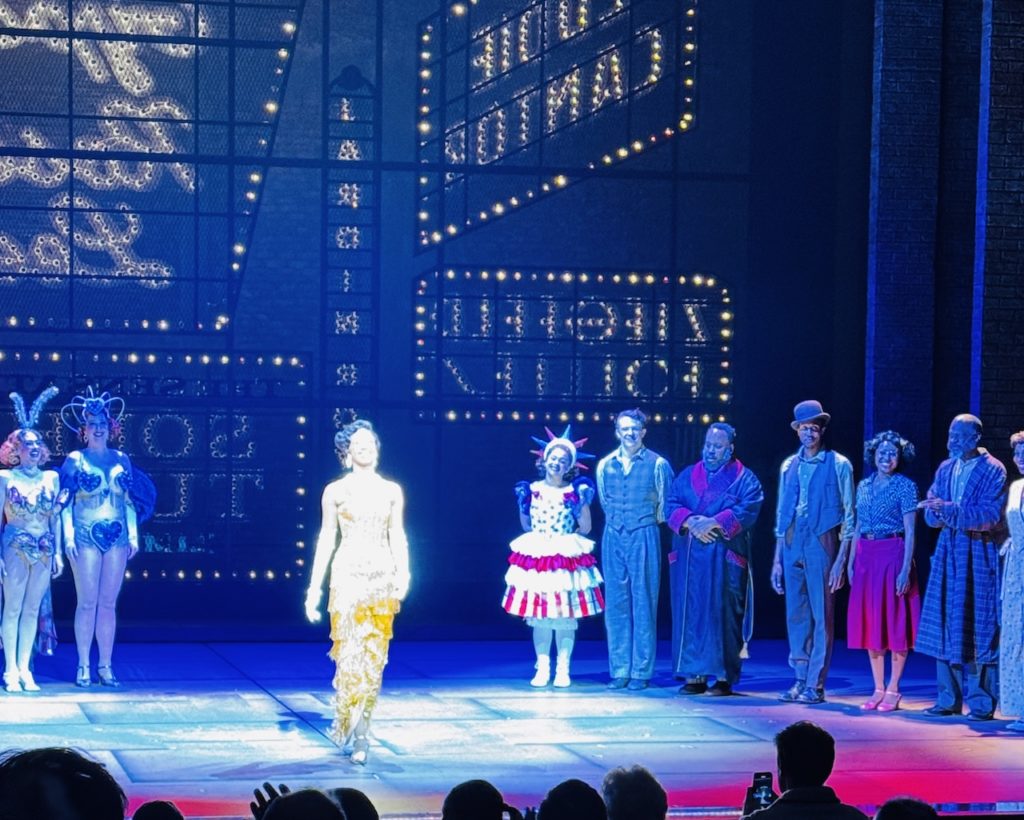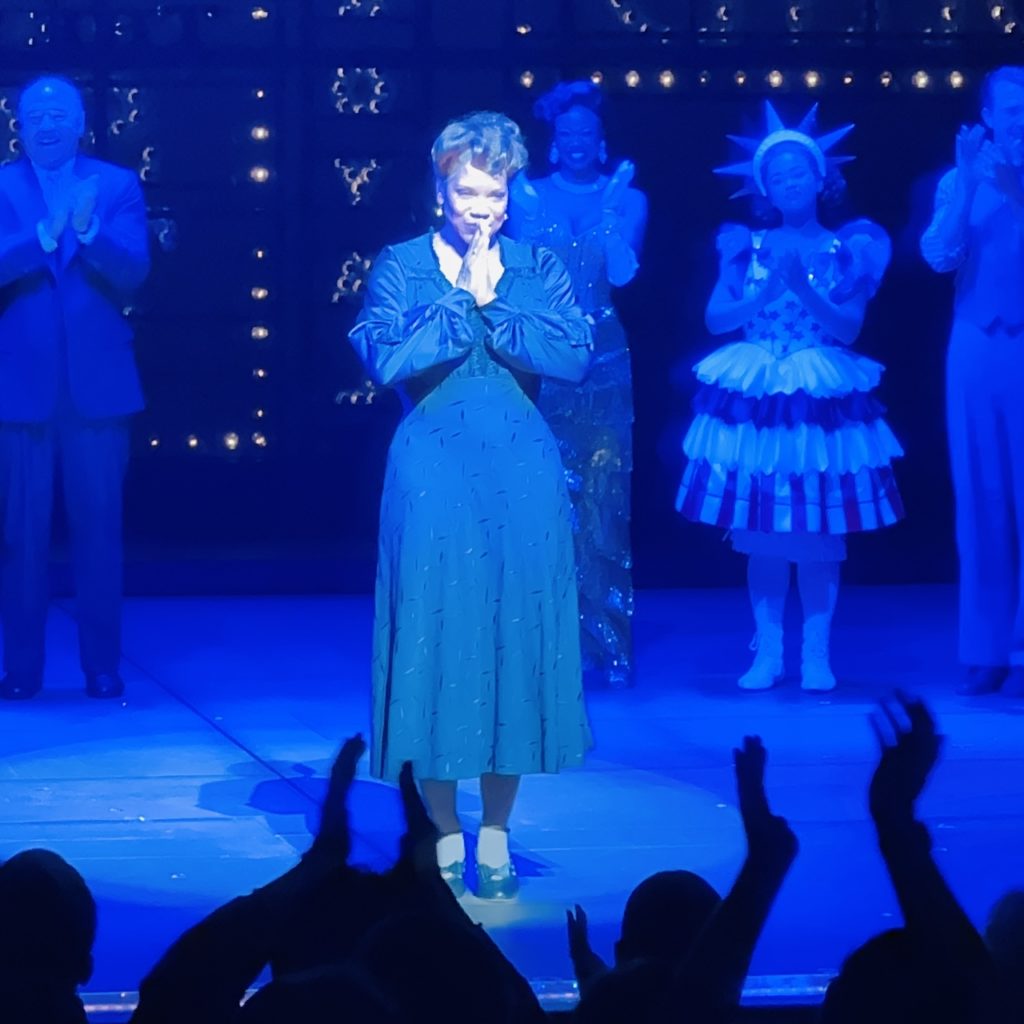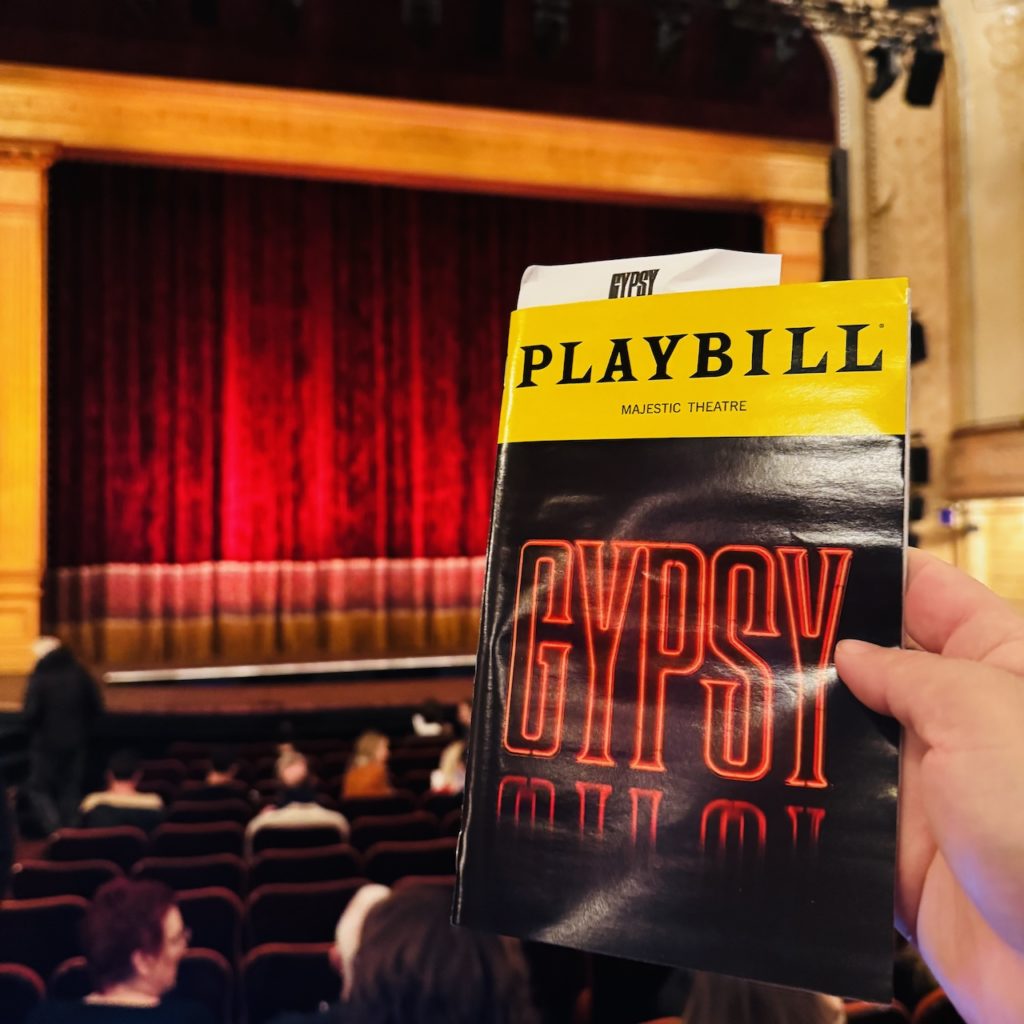00059: GYPSY (Broadway Musical Review)
As someone who teaches musical theatre and has dedicated his last 10 years of teaching to centering people of color within the theatre world, I have talked about George C. Wolfe and other African American theatre artist who have tried to break the Broadway mold. Going to see Gypsy was not about seeing the musical but the work of George C. Wolfe as director and the star of the show, Audra McDonald.
During the fall semester, I talked about Shuffle Along (among many other shows), which was done on Broadway in 1921, and how this musical was an influence to many other musicals of the time. I also talked about George C. Wolfe and his reimagining of the musical, giving it a new titled, Shuffle Along or the Making of the Musical Sensation of 1921 and all that Followed. And while I never saw the adaptation, I know a few things about it to understand that George C. Wolfe tried to make a statement in regards to African American entertainers and Broadway. And so, with this in mind, I took my seat at the Majestic Theatre to enjoy the greatness of Audra and Wolfe, but I was not ready for what was about to happen.
To say that the production under George C. Wolf was spectacular is an understatement. To say that Audra was a marvel to watch on stage is diminishing her talent. Both the direction and acting were strong (as expected) and far more emotional and challenging (in a good way) than expected. I also anticipated the director to make settle but very important statements about race with the production. He didn’t disappoint.
The music, the lyrics, and the story are all great, most of us know that. After all, the majority of historians and theatre critics considered Gypsy the best musical ever written. They are not wrong, okay, we are not wrong. The sets, the lights, the costumes, and the makeup, were all, of course, on point. The acting, the singing, and the dancing, as well as the choreography were also all excellent. What I want to concentrate on, instead, is the directorial approach by Wolfe and the interpretation of Rose by McDonald.
To start, when Rose “collects” the different boys that will be part of June’s act, all the boys are African American. I expected this because this is George C. Wolfe and he could make that happen. Also, Rose and her two daughters are African American so it made sense to have an ensemble of Black boys. But once the musical number that serves to show the passing of time comes around and the boys “grow up,” they are all replaced by White teenagers. And while this switch may not have a significance to many in the audience, it does become a very important choice and statement from the director. It sets up the question: Why make such change? The answer, of course, comes later in the story.
Second: When June and Louise find themselves waiting for her mother and George to discuss their new vaudeville contract with an influential producer, the two sisters sing the musical number “If Mama was Married.” It is here in this number where we clearly see two sisters who, although love their mother, have started to develop a desire to be free from their mother’s tight grip. But while Louise (played by Joy Woods) always sings the phrase “if mama was married,” in a sweet tone, projecting a hope that she may or may not be able to reach, June sings the same phrase with anger, projecting a very strong resentment towards her mother.
Never before have I seen such interpretation of the song. People, including myself, laughed at some of the commentary the girls made about their mother, and we also start to feel sorry for the young women. With Jordan Tyson in the role of June, you also start to see how this song becomes the moment when June expresses the hate she feels toward her own mother. While both actresses have strong voices, sing with energy, and beautiful harmonies, their interpretation under Wolfe’s direction, turns this song into a foreshadowing and a sad reality for the sisters, who, sooner or later will have to be strong enough to disengage from their mother, especially June who is now showing us a life that is horrifying to her rather than filled with joy. Her anger and resentment is real.
Later in the story, Rose finds out that June and one of the boys from the act have gotten married behind her back; they also have eloped. Rose, then decides that Louise will now lead their vaudevillian act but instead of creating a new act for Louise, Rose simply tries to make Louise like June, forceing her to wear June’s blonde wig. But Louise isn’t happy with Rose’s choice so she tells her mother, “I don’t want to be blonde; I want to use my own black hair.” It is at this moment when we are able to connect the reason why Rose “switched” from having young black boys to white teens. We come to realized that Rose not only wanted June to be successful in show business, but understood that in oder to “make it,” June needed to portray the “blonde beauty.” This is a very poignant moment in the musical because without changing anything in the musical, in terms of its writing, Mr. Wolfe highlights the difficulty and struggles vaudeville black troupes experienced (and how today Black actors continue to experience) in show business. Rose’s decision to replace her black boys for white teenagers is a “smart” career move, and a smart directorial decision to highlight the struggle of Black entertainers.
Let’s move now to Audra’s performance. From the start, Audra commands attention, mainly because she is a powerhouse on stage. One cannot help but to cheer and clap the moment she enters. But also because the way she slowly injects little acting choices to Mama Rose. At first, she’s just a regular stage mom, with demands about this and that. But soon, we start to see beyond the strong-will woman who wants her daughter June to succeed in show business. We start to see her obsession, her over-powering control over every single detail of those around her, including George (played incredibly strong by Danny Burstein), who slowly and surely figures out that Rose has only one objective: show business.
As the story develops, Audra’s Rose start to show signs of weakness and fear. “Everyone always leaves me,” she tells us. And while we all may feel sorry for her, we quickly start to understand that it is her own doing that makes people leave. I was closed enough to see Audra’s eyes twitch, her hands tremble, her mind drifting in thought whenever a situation became difficult. When June leaves, Rose only allows her a few seconds in her mind, and you almost see the pain in Audra’s face, but, all of the sudden, she hides her pain by deciding to rebuild the vaudeville act with Louise at the front.
Later, when the day comes for Rose to marry George, we all know is not going to happen because, in previous scene, when George asked her to marry her, Rose’s answer was “yes,” but Audra’s body language and facial expression was telling us otherwise-the twitching and hand-shaking was there again. The day of the wedding, we see Rose feeling uneasy, and it is Audra’s defeated body language and mumbling lines that let us know that not only her show business dream has come to an end, but also that she does not want to marry the man that loves her. Yet there is no escape for she promised George to marry him when their vaudeville act contract ended. And by now, all the members of their vaudeville act have gone, so she must fulfill her promise. Yet, when she suddenly hears that the headliner for the burlesque act is nowhere to be found and that the show is in a bind, Audra’s body suddenly perks up, and as if hit by a lightning bolt, Rose is full of energy and decision making, telling the burlesque director that her daughter Louise can fill the lead’s spot. It is here where George comes to a realization and decides to leave Rose as she sacrifices her daughter Louise’s freedom and happiness, over a burlesque act.
And so, Louise becomes the infamous Gypsy Rose Lee, and even with all her success, she isn’t able to make her mother Rose entirely happy. We see a depressed woman now, and, at the same time, a woman who sacrificed everything for her daughters, and who also regrets not being under the spotlight herself. When Audra sing the gut-wrenching last song (“Rose’s Turn”) we are witnesses to a woman who slowly starts to deteriorate before our very own eyes. The repetition of the lyrics and the inability to sing some of them, suddenly become hunting, shocking, and horrifying as we see Rose loosing her composure, her mind, and her spirit. By the end of the song, we are devastated because Mrs. McDonald delivers one of the most powerful interpretations of the song ever done before. The Rose we met at the top of the show is no more. Yes, many actresses before Mrs. MacDonal have belted the song to stratosphere levels, Audra doesn’t need to do that, all she needs to do is deliver a powerful interpretive performance, which she does as no one ever before. And that brought not only chills but tears to Louise, who is watching her mother from the sidelines, and also to the eyes of many audience members, including me.
At the end of the song, the audience stood up on their feet, given Mrs. McDonald an almost five-minute ovation that was only stopped by Louise’s first line in the last scene, and while in prior performances Louise has walked off stage, leaving her mother behind, or has walked off stage and has signaled Rose to join her, in this production, Louise gives her mother her expensive lush fur shoulder boa and a very strong heart-felt hug. Then, showing her compassion, offers Rose her hand, and slowly both, mother and daughter walk off into the sunset. And the tears continue.
This musicals gets four very emotional snaps!




Leave a Reply
You must be logged in to post a comment.